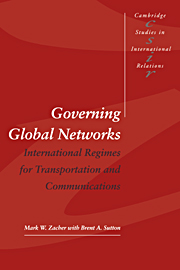Book contents
- Frontmatter
- Contents
- Preface
- Acknowledgments
- 1 International regimes and global networks
- 2 Mutual interests and international regime theory
- 3 The international shipping regime
- 4 The international air transport regime
- 5 The international telecommunications regime
- 6 The international postal regime
- 7 Normative continuities and international regime theory
- Notes
- Index
- Titles in the series
7 - Normative continuities and international regime theory
Published online by Cambridge University Press: 27 August 2009
- Frontmatter
- Contents
- Preface
- Acknowledgments
- 1 International regimes and global networks
- 2 Mutual interests and international regime theory
- 3 The international shipping regime
- 4 The international air transport regime
- 5 The international telecommunications regime
- 6 The international postal regime
- 7 Normative continuities and international regime theory
- Notes
- Index
- Titles in the series
Summary
The descriptive focuses of this study are the norms of the four international regimes and their strength. The explanatory focuses are the assertions that mutual interests among states have sustained the four regimes and that these economic and political mutual interests are generated by the existence of “market failures” and certain conditions that impinge on the autonomy of all or most states. At a theoretical level the book generally supports a neoliberal perspective that mutual interests can form the basis of important international regimes, but it also stresses that neorealists have overlooked the possibility that regime norms based on the protection of state policy autonomy may be quite compatible with its assumptions and its views on obstacles to cooperation.
This concluding chapter first looks at the norms, the principles that they promote, and the conditions that generated mutual interests in the norms in the four policy sectors (jurisdictional rights, damage control problems, technical and procedural barriers, and prices and market shares). It then turns to general indicators of the importance of mutual interests to regime development and general theoretical perspectives on international cooperation.
Similarities in norms across the four industry regimes
There have been significant similarities in the norms governing international shipping, air transport, telecommunications, and postal services.
- Type
- Chapter
- Information
- Governing Global NetworksInternational Regimes for Transportation and Communications, pp. 212 - 233Publisher: Cambridge University PressPrint publication year: 1995



